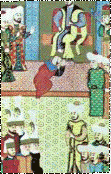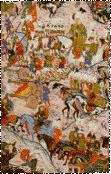| |

|
|

 |
5
OF 8 |
 |
 The
war soon became a European war when Britain and France allied with
the Ottomans in order to protect their lucrative trade interests
in the region. The war ended badly for the Russians, and the Paris
peace of 1856 was unfavorable to them. In textbooks, the Crimean
War is presented entirely from the perspective of the Europeans,
for it brought home the fact that more European powers were willing
to overthrow the old order than to maintain it. It had, though,
important consequences for the Ottoman Empire, as well. From this
point onwards, the Ottoman Empire saw itself as being heavily controlled
by Europeans. The Crimean War initiated a decline in Ottoman morale
and a helplessness. Europeans, for their part, no longer saw the
Ottomans as an equal force to be reckoned with, but as a tool to
be used in larger European concerns. The
war soon became a European war when Britain and France allied with
the Ottomans in order to protect their lucrative trade interests
in the region. The war ended badly for the Russians, and the Paris
peace of 1856 was unfavorable to them. In textbooks, the Crimean
War is presented entirely from the perspective of the Europeans,
for it brought home the fact that more European powers were willing
to overthrow the old order than to maintain it. It had, though,
important consequences for the Ottoman Empire, as well. From this
point onwards, the Ottoman Empire saw itself as being heavily controlled
by Europeans. The Crimean War initiated a decline in Ottoman morale
and a helplessness. Europeans, for their part, no longer saw the
Ottomans as an equal force to be reckoned with, but as a tool to
be used in larger European concerns.
The Balkan Rebellion
The expansionist Russians desired several key
territories from the Ottomans, and the only thing that really prevented
them from aggressively annexing them was the balance of power in
Europe. In particular, they feared Austria and Germany, which did
not want to see Russia in control of eastern Europe. The real prize
for the Russians was the city of Istanbul, which the Russians still
called Constantinople. If they could seize this city, that meant
that they would control all trade between Europe and Asia that proceeded
through the Black Sea. The Ottomans, for their part, had lost morale.
The old military state, confident in its ability to protect the
Islamic world from European predation, was crumbling in its confidence
because of a series of defeats and draws in wars with Russia.
 In
1875, the Slavic people living in the Ottoman provinces of Bosnia
and Herzegovina (currently the state of Bosnia-Herzegovina), led
an uprising against the Ottomans in order to gain their freedom.
The general weakness of the Ottomans led two independent, neighbor
Slavic states, Montenegro and Serbia, to aid the rebellion. Within
a year, the rebellion spread to the Ottoman province of Bulgaria.
The rebellion was part of a larger political movement called the
Pan-Slavic movement, which had as its goal the unification of all
Slavic people&emdash;most of whom were under the control of
Austria, Germany, and the Ottoman Empire&emdash;into a single
political unity under the protection of Russia. Anxious also to
conquer the Ottomans themselves and seize Istanbul, the Russians
allied with the rebels, Serbia, and Montenegro and declared war
against the Ottomans In
1875, the Slavic people living in the Ottoman provinces of Bosnia
and Herzegovina (currently the state of Bosnia-Herzegovina), led
an uprising against the Ottomans in order to gain their freedom.
The general weakness of the Ottomans led two independent, neighbor
Slavic states, Montenegro and Serbia, to aid the rebellion. Within
a year, the rebellion spread to the Ottoman province of Bulgaria.
The rebellion was part of a larger political movement called the
Pan-Slavic movement, which had as its goal the unification of all
Slavic people&emdash;most of whom were under the control of
Austria, Germany, and the Ottoman Empire&emdash;into a single
political unity under the protection of Russia. Anxious also to
conquer the Ottomans themselves and seize Istanbul, the Russians
allied with the rebels, Serbia, and Montenegro and declared war
against the Ottomans
 |
5
OF 8 |
 |
|
|


